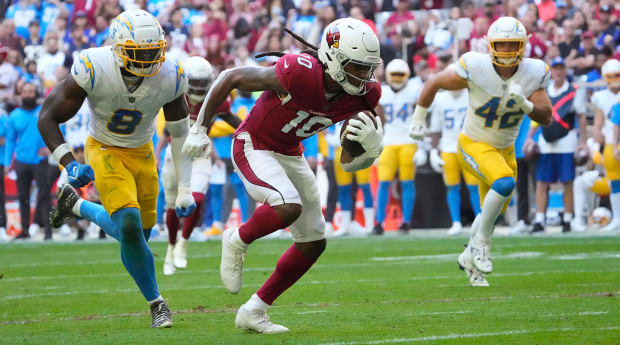So, as it turns out, the DeAndre Hopkins sweepstakes is a little bit less like a sweepstakes and a little bit more like a used boat sale. Buying the boat could be great. It could get you exactly where you want to be (presumably, tied up with a bunch of other boats in the middle of a hot lake talking about how great it is to be on a boat).
It also represents a bit of a financial gamble without a ton of perceived upside, and one that most people aren’t willing to take. Teammate Albert Breer did a nice job breaking this whole process down, explaining why Hopkins wasn’t able to be traded and why he remains, in essence, a boat for sale.
Throughout the week, though, I’ve been wondering why seemingly everyone is talking about only the Chiefs and Bills as prospective buyers. Sure, Hopkins has a lot to do with this. If he is going to have to take a massive pay cut, he’s going to want to do it in a place where he’s competing for a Super Bowl title. There are about six or seven teams this year good enough to compete for a Super Bowl, with the Bills and Chiefs most certainly among them.
However: Why aren’t the Browns positioning themselves in the same manner? While other teams certainly make more sense for Hopkins, the Browns have already completely debased themselves for the privilege of signing Deshaun Watson. Clearly their groveling skills are elite. Are they so confident in a combination of Amari Cooper (soon to be 29), Nick Chubb (530 carries over the past two seasons, turning 28 in December), Donovan Peoples-Jones, David Njoku and Elijah Moore that they are finished making calls? Moore was deemed expendable by the Jets last year.
Watch the Browns with fuboTV. Start your free trial today.

Michael Chow/USA TODAY Sports
Coach Kevin Stefanski said Cleveland is, which is what a coach is supposed to say. But what about a person complicit (albeit less so than GM Andrew Berry) in signing Watson in the first place?
Let’s remember something: If Watson plays average (or worse) football this season, it would unquestionably top the list of most embarrassing moments in Browns history. Drafting a small QB, or an old QB, or a wild card with a penchant for ignoring play calls is one thing (Cleveland has a long list of draft busts for a variety of reasons). Willingly signing Watson at the time the Browns did, and paying the money they paid, has made this a completely binary set of outcomes. If Watson is excellent, the Browns can justify (to themselves) and ultimately bury the circumstances under which they signed him. If Watson is not excellent, the Browns will have to answer for their decision-making processes for a generation.
In fairness, Peoples-Jones is an underrated talent. FiveThirtyEight’s in-depth wide receivers project noted he was one of the best receivers in the NFL at actually coming down with footballs (the project graded receivers on their ability to get open, their ability to secure the ball and their ability to gain yardage after the catch). We also don’t know who Hopkins will be going into his age-31 season, which is a bit of a dicey threshold for players at the position. Julio Jones was never really the same beyond that point. The same could be said for A.J. Green. However, other elite wide receivers such as Larry Fitzgerald, Julian Edelman, Steve Smith and Anquan Boldin (to name a few) had much better twilights.
But if you’re running the Browns, how much does that really matter? Shouldn’t you be in complete and total self-preservation mode at this point? Remember, Watson and Hopkins were teammates in Houston, and Hopkins had three All-Pro seasons catching passes from Watson. If Hopkins is great and he helps Watson at least become comfortable in an NFL pocket again, isn’t that worth it? If Hopkins is bad, don’t you at least want to be able to say that you did absolutely everything in your power to make it work?
The Browns have already purchased waterfront property. They already have a dock. They already dress like Boat Guys. They are at the point when, no matter how nonsensical acquiring a used boat may be, it is the only decision now.







